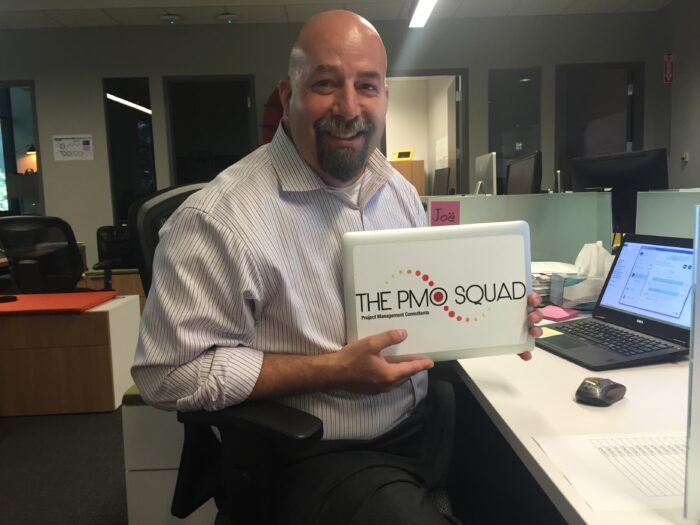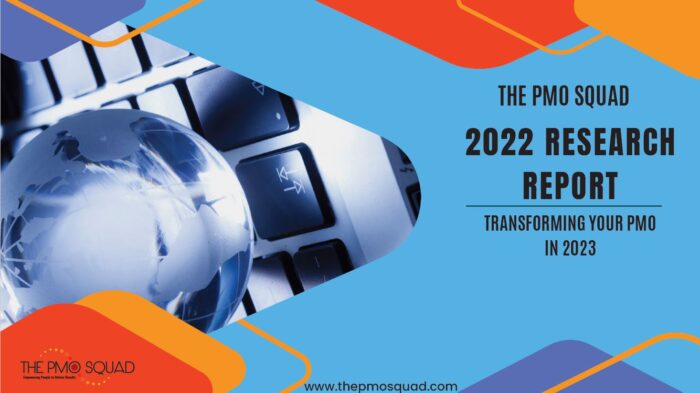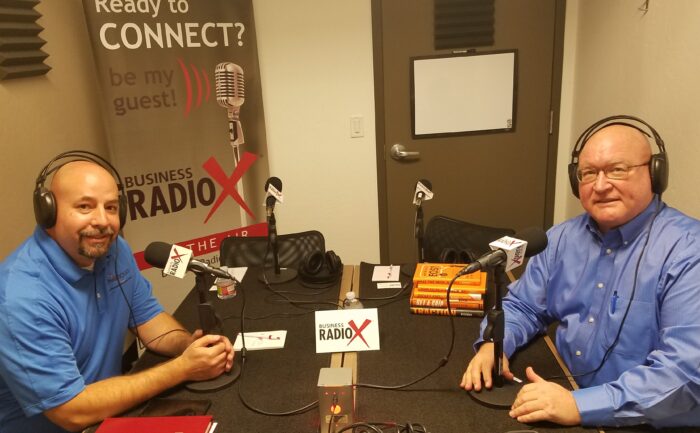Interview with Joe Pusz, ‘PMO Joe’, internationally recognized leader in the Project Management and PMO community, conducted by Michał Barcik
Hi Joe, fantastic that you agreed to be interviewed by us. To start, could you say in a few words what you do for a living and what you are passionate about in life?
Thank you for the opportunity to share my story with all of you. I am the Founder and President of The PMO Squad. We are a PMO and Project Management consulting firm located in the United States. We’re passionate about taking the complex and simplifying so that our clients can delivery projects better for their organization. You can learn more about us at www.thepmosquad.com.
When did you realize that project management and PMO development in organizations is something you want to associate your career with?
Early in my career I was a software consultant who assisted and trained customers to use our software. One day, my boss asked me how my project was going, and I had no idea what he was talking about. He explained project management to me and I was hooked instantly. That was about 30 years ago, and I didn’t even know that a Project Manager or a PMO Leader could be a career choice. After investigating a bit, I knew this was my calling and I began taking Project Management courses at Georgia Tech University which then led to my long PM related career. Project Management has been at the center of my career which has spanned multiple industries, different size organizations and eventually starting my own firm, a global community, and a non-profit organization.
 Fot. Joe's archive
Fot. Joe's archiveYour company has completed a very interesting study on the role of the PMO, its perception in organizations and the post-pandemic condition – I would like to build on this study in this discussion. Can you tell us something about the genesis, what drove you to do this?
Yes, we did a global research study in 2022 and learned quite a bit from a very diverse group of respondents. We did the study because it always seems that the same groups do research in our industry. I wanted to see if the results would be different if conducted by a smaller consulting firm rather than a large industry association such as PMI or Gartner. I also wanted to ask some different questions than the traditional research reports. For instance, we inquired about military service to see if we could find any correlation between military training and PMO performance. We also asked about COVID, coaching, mentoring and a few other non-traditional items. It was a very interesting exercise and invite you to download the results – www.thepmosquad.com/research-report. We’re looking to do follow up research in 2024 and dig deeper into some of the findings and analysis.

I would like to start by asking you about a question related to the size of the PMO in a post-pandemic reality. The study shows that the PMO, taking into account the number of employees, has remained stable. Has anything surprised you here?
There were definitely items that surprised us. Regarding PMO size specifically, we weren’t sure what we’d learn. We estimated that PMOs might shrink a bit as many companies around the world had encountered financial hardships and reduced headcount. Interestingly, however, the pandemic resulted in a tremendous amount of change for organizations. As we all know, at the forefront for that change is the PMO and project delivery. Recall that in a matter of weeks, companies were forced to execute digital transformation projects that may have been planned for the next decade. Companies had to learn how to work remote, adjust or improve security, networks, collaboration. All this work, all these projects, put PMOs in the spotlight. So, while there was some initial surprise that PMO staffing remained in place, it was understandable considering the importance of project work to help companies adapt to the changing environment caused by COVID.
Key is the fact that 78% of PMO leaders do not measure the value of their departments. And let’s recall this is the department that is responsible for the smooth implementation of often strategic projects in organizations. How do you interpret this fact? What is the reason for this?
This was perhaps the most shocking and surprising item from the research. Think about all the different departments in an organization, Sales, Accounting, HR, etc. Leaders of these departments all have key measures to understand the value they are providing to the organization. However, PMO Leaders are failing miserably here. In large part we think PMO Leaders aren’t properly prepared for their leadership roles. The majority have been promoted from a Project Management role to the PMO Leader position and the roles are vastly different. We still see PMO Dashboards that reflect the status of each project budget and schedule but these provide minimal value to the Executive Level of an organization. The PMO is the home for all the projects in the organization, yet we rarely understand the value of these projects. We need to have a mindset shift from our PMO Leaders who are driving value performance rather than project performance.
 Fot. Joe's archive
Fot. Joe's archiveWhat do you see as prescriptions for improving this? There is still much to be done here.
Yes, there is a tremendous amount of opportunity here for improvement. Think about all the investment around the world on the individual in our industry. We have so many Agile and PM certifications available but very few PMO and PMO Leadership certifications. The PMO Leader role is slowly starting to evolve, and I believe we’ll see a big uptick in the coming years with certifications, coaching, mentoring and training. When we examine the best PMOs in the world, we see there is a long journey to achieve PMO success and impact. Part of that journey includes developing the PMO Leader and growing their leadership capabilities. When we learn from these PMO success stories we can share through coaching and mentoring as well as training. Organizations are hungry for improvement from their project delivery teams and I believe they will be willing to invest in these PMO Leaders.
What other main conclusions are we able to extract from your report?
We keep seeing the same, or similar, results year over year, regardless of who is doing the research. This tells us that we’re not doing enough as an industry to solve our challenges. For instance, Resource Management is consistently listed as one of the top challenges PMO Leaders and organizations face. This was true in our research as well. We did additional investigation and found many other research studies going back over 10 years that also list Resource Management as a challenge. We also searched for Resource Management solutions over the past decade and aside from differing approaches from software providers we can’t find accepted solutions consistently deployed to solve this universal problem. As mentioned previously, as an industry we invest in the individual, but a PMP or CSM certification or training does not address an organizational issue like Resource Management. The PMO Squad has found that when we shift organizational focus from project management to project delivery clients embrace organizational challenges differently than project challenges. Assigning, balancing, prioritizing, and evaluating resources is not a challenge for the PMO, it’s a challenge for the organization and an organizational change is needed to solve this. We’ve had tremendous client success by helping them understand that delivering the project is more important than managing the project. Project Delivery is an organization mindset while Project Management is an individual mindset.
 Fot. Joe's archive
Fot. Joe's archiveYou also mention quite a lot about human resources in the organization and the continuous development of employees. There has been a lot of talk recently about the role of mentoring and coaching and how it effectively helps leaders develop. From your perspective, how should organizations develop their project managers?
One alarming item from our research was how little organizations are investing in ongoing training for their project managers. There seems to be an acceptance to invest for a PMP or CSM type certification, but limited investment after that to ensure PMs are receiving continuous training. Think about other professionals who are in the “Arts” such as athletes, musicians, actors. They receive training their entire career even after they reach the top of their industry. In Project Management we don’t make that same investment. We expect that if you’ve passed a certification test you know what you’re doing, and we don’t provide an environment for continuous improvement. I regularly ask PMO Leaders how often they practice project management with their PMs. I get a lot of strange looks when I ask that question and they’ll ask back, why would we practice or how do we practice? Every project is unique, every company is unique, team members are unique, software is unique, and business conditions are regularly changing. So, how do we expect a PM to stay up to date and prepared for the unknown project with his/her next assignment? To do this we need coaching, mentoring, practice, and ongoing training.
Finally, I would still like to ask you about what you think the PMO of the future will look like. How do you predict it? From your knowledge and experience, can you tell how PMOs should develop to fulfill their function in the company even better?
I get asked this question quite a bit and I’m not sure I’ve ever had a good answer. I’m not a fan of PMO predictions because we’re still in the infancy with PMOs. I’ll give it a shot though… the PMOs of the future will eventually be a C-suite function. For the duration of their existence organizations have been focused on Operations to ensure the widgets and services being produced are done as efficiently and profitably as possible. As project delivery continues to evolve organizations are realizing there is competitive advantage in placing as much emphasis on successful project outcomes as there is on successful operations. With this evolution, the Chief Project Officer will be standing side by side with the Chief Operating Officer. One to drive ongoing, repeatable work and the other to drive change and project delivery. This won’t be next year or perhaps even within the next decade, but I do believe we’ll see the acceptance of the CPO role in the not-too-distant future.

Joe Pusz, PMO Joe is an internationally recognized leader in the Project Management and PMO community. He is a frequent Keynote Speaker, Author, Project Management Innovator and was named the 2022 Americas PMO Influencer of the Year by the PMO Global Alliance. Joe speaks on topics of Leadership, PMOs, Purpose Driven Mindset, the Project Management Journey, and a variety of other trending Project Management topics.
He is the Founder and President of THE PMO SQUAD, a Phoenix-based PMO and Project Management Consulting firm serving clients across the United States. The PMO Squad was named Winner 2022 Small Business Awards by the Phoenix Business Journal. Joe is the host of the Project Management Office Hours Radio Show and Podcast providing Project Management Leaders a voice within our community. The show has over 40 million plays and downloads featuring guests from around the world. Joe is also Co-Founder of VPMMA, the Veteran Project Manager Mentor Alliance which is a 501c3 Non-Profit Organization assisting Veterans seeking to transition into civilian Project Management careers. He is the Founder of The PMO Leader global community. The community is the only global e-commerce community for PMO Leaders and teams to share content, gain knowledge, and exchange experiences. Joe supports our industry having served as a Judge for the Global PMO Awards, participates with the PMI Executive Roundtable on PMOs, and is a long-time member of the Project Management Institute. He has been a PMI Volunteer, Sponsor, and Mentor.
Absolwent Akademii Górniczo-Hutniczej w Krakowie oraz Szkoły Przywództwa Instytutu Wolności. Od początku kariery zawodowej związany z branżą FMCG, gdzie odpowiada za marketing, trade marketing i zarządzanie projektami. Miał przyjemność dołożyć swoją cegiełkę do komunikacji i rozwoju znanych marek jak: Lubella, Tymbark, Hit czy Cadbury. Aktualnie zarządza europejskim portfelem marek firmy Mondelez i współodpowiada za ich wyniki finansowe na ponad 20 rynkach. Wykładowca na kierunku Digital Transformation Manager na swojej Alma Mater. Pasjonat ekonomii behawioralnej.